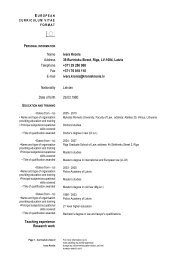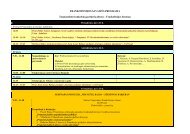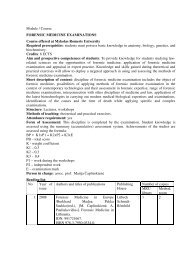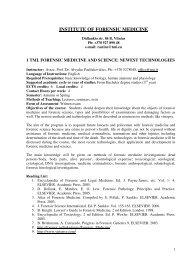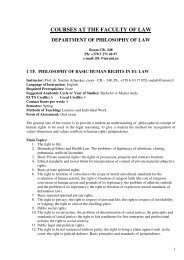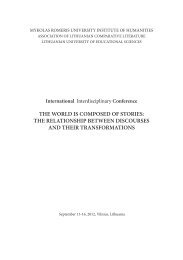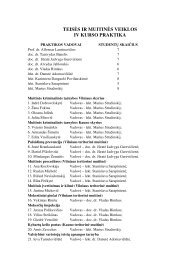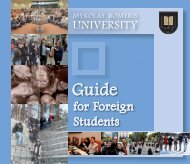Name of Lecturer: Prof. dr. Saulius Arlauskas tfk@mruni.lt
Name of Lecturer: Prof. dr. Saulius Arlauskas tfk@mruni.lt
Name of Lecturer: Prof. dr. Saulius Arlauskas tfk@mruni.lt
You also want an ePaper? Increase the reach of your titles
YUMPU automatically turns print PDFs into web optimized ePapers that Google loves.
Introduction to Lithuanian Civil Law<br />
<strong>Name</strong> <strong>of</strong> <strong>Lecturer</strong>: Assoc. pr<strong>of</strong>. <strong>dr</strong>. A.Tikniūtė, Assoc.pr<strong>of</strong>. <strong>dr</strong>.D.Vasarienė<br />
Facu<strong>lt</strong>y: Law Facu<strong>lt</strong>y<br />
Department, Contact Details: Civil and Commercial Law department,<br />
ckk@mruni.eu<br />
Language <strong>of</strong> instruction: English<br />
Level <strong>of</strong> Course Unit: Bachelor<br />
Year <strong>of</strong> Study (if applicable):<br />
Required prerequisites: none<br />
Learning Outcomes <strong>of</strong> the Course Unit. A student will know the basic topics <strong>of</strong><br />
Lithuanian civil law, such as legal regime <strong>of</strong> natural persons, legal entities, basic<br />
concepts <strong>of</strong> family law, contract law, prerequisites <strong>of</strong> civil liability. Student will be<br />
able to distinguish the law applicable to above mentioned institutes and will have<br />
basic comparative perspective on these issues.<br />
ECTS credits: 6<br />
Contact hours per week: 3<br />
Semester: Autumn/Spring<br />
Planned Learning Activities and Teaching Methods: Lectures, seminars, case<br />
analysis, comparative presentations <strong>of</strong> students.<br />
Assessment methods and Criteria:<br />
Active participation in the seminars, final exam.<br />
Course content: (up to 10 sentences)<br />
Course covers following topics: the introductory lecture presents historical<br />
background <strong>of</strong> Lithuanian civil law. The presentation <strong>of</strong> Lithuanian civil law starts<br />
from natural persons, their civil capacity, main juridical facts concerning the legal<br />
status <strong>of</strong> natural person. The emphasis is put on legal entities as well– basic<br />
classifications, governance rules <strong>of</strong> legal entities, termination prerequisites are<br />
discussed. One lecture is dedicated to general issues on family law – to the<br />
prerequisites <strong>of</strong> the validity <strong>of</strong> marriage, conditions for nullity <strong>of</strong> marriage, effect <strong>of</strong><br />
marital regime on property rights. Several lectures are devoted to contract law – to<br />
validity prerequisites and voidability <strong>of</strong> contracts. The final part is designated to civil<br />
liability issues - kinds <strong>of</strong> liability, prerequisites, exemption from liability in Lithuania<br />
as well as in other European countries.<br />
Reading list: (maximum 5 items)<br />
1. Principles, definitions and model rules <strong>of</strong> European private law: <strong>dr</strong>aft common<br />
frame <strong>of</strong> reference (DCFR) /prepared by the Study Group on a European Civil Code<br />
and the Research Group on EC Private Law (Acquis Group) ; edited by Christian von<br />
Bar and Eric Clive.. München : Sellier European Law Publishers, 2009..<br />
2. Tadas Klimas. Casebook: Comparative Contract Law, Carolina Academic Press<br />
(2006).<br />
3. Principles <strong>of</strong> European tort law, text and commentary, European Group on Tort<br />
Law, Centre <strong>of</strong> Tort and Insurance Law, Springer 2005.<br />
4. Principles <strong>of</strong> European contract law, edited by Ole Lando, Kluwer Law<br />
International, 2000-2002.<br />
6



